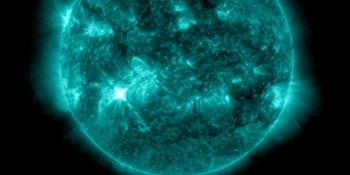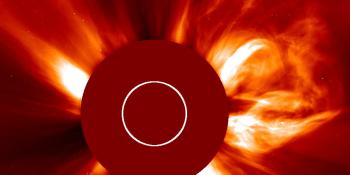Visualizzazione archivio di martedì, 31 maggio AM
Rapporto attività solare
Ogni brillamento solare menzionato nel rapporto ha un fattore di scala, applicato dal Centro di Predizione Meteorologica Spaziale (SWPC). A causa del fattore di scala del SWPC, i brillamenti solari sono segnalati come ridotti del 42%, rispetto ai dati di qualità scientifica. Il fattore di scala è stato rimosso dai nostri dati archiviati sui brillamenti solari, per riflettere le unità fisiche reali.
Rapporto dell'Attività Geofisica Solare 2011 May 31 2200 UTCPreparati dal SWPC della NOAA© ed elaborati da SpaceWeatherLive.com
Rapporto Congiunto USAF/NOAA dell'Attività Solare e Geofisica
SDF Numero 151 Emesso alle 2200Z il May 31 2011IA. Analisi delle Regioni Solari Attive e Attività dalle 2100Z-30 alle 2100Z-31 Solar activity has been low. Region 1226 (S22E27) and
Region 1227 (S18E39) each produced C1 x-ray events in the past 24
hours. Region 1226 was classified as a Dhc group with Beta magnetic
characteristics while Region 1227 was a Dsi group with more complex
Beta-Gamma characteristics. Region 1228 (N17E50) rapidly evolved
into a Cso type group as new trailing spots emerged. New Region
1230 (N19E58) was numbered today. This new region, and the remainng
regions, were generally quiescent, small and magnetically simple.
IB. Previsione dell'Attività Solare
Solar activity is expected to be low,
with a slight chance for M-class events for the next three days (1 -
3 Jun).
IIA. Sommario dell'Attività Geofisica dalle 2100Z-30 alle 2100Z-31
The geomagnetic field ranged from quiet to active levels over the
past 24 hours. Heliospheric imagery from STEREO-B suggests the
increased activity was the result of a transient, weak CME. The
greater than 2 MeV electron flux at geosynchronous orbit reached
high levels during the period.
IIB. Previsione dell'Attività Geofisica
The geomagnetic field is
expected to be unsettled to active on day 1 (01 Jun) , quiet to
unsettled on day 2 (02 Jun), and unsettled to active on day 3 (03
Jun). ENLIL model output indicates the passage of the 29 May CME
early on day 1. A brief return to generally quiet conditions on day
2 is followed by disturbed conditions on day 3 as a recurrent
coronal hole high speed stream begins to influence the
magnetosphere.
III. Probabilità dell'Evento dalle Jun del 01 alle Jun del 03
| Classe M | 20% | 20% | 20% |
| Classe X | 01% | 01% | 01% |
| Protone | 01% | 01% | 01% |
| PCAF | green | ||
IV. Flusso di 10.7 cm di Penticton
Osservato 31 May 112 Previsto 01 Jun-03 Jun 115/115/110 Media di 90 Giorni 31 May 108
V. Indici Geomagnetici A
Osservato Afr/Ap 30 May 007/009 Stimato Afr/Ap 31 May 010/012 Previsto Afr/Ap 01 Jun-03 Jun 010/010-007/008-010/010
VI. Probabilità dell'Attività Geomagnetica dal 01 Jun al 03 Jun
| A. Latitudini Medie | |||
|---|---|---|---|
| Attivo | 20% | 10% | 20% |
| Tempesta minore | 10% | 05% | 10% |
| Tempesta maggiore-grave | 05% | 01% | 05% |
| B. Latitudini Alte | |||
|---|---|---|---|
| Attivo | 20% | 15% | 20% |
| Tempesta minore | 25% | 10% | 20% |
| Tempesta maggiore-grave | 10% | 05% | 15% |
Tutti gli orari in UTC
<< Vai alla pagina della panoramica giornaliera
Ultime notizie
Ultimi messaggi dal forum
Strong far side CME 3442024/12/23 AR13932 M8.9 & M4.1 associated CMEs 51AR 3938 26Ask your obscure/"stupid" space weather questions. 138Sunspot Latitudes at or near Solar Maximum 78
Altri argomentiSupporta SpaceWeatherLive.com!
Molte persone vengono su SpaceWeatherLive per seguire l'attività del Sole o sapere se ci sia la possibilità di vedere l'aurora, ma a maggior traffico corrispondono costi maggiori. Considerate una donazione se vi piace SpaceWeatherLive così che possiamo mantenere online il sito web!

Notizie sul meteo spaziale
| Ultimo brillamento X | 2024/12/08 | X2.2 |
| Ultimo brillamento M | 2024/12/26 | M7.3 |
| Ultima tempesta geomagnetica | 2024/12/17 | Kp5+ (G1) |
| Giorni senza macchie | |
|---|---|
| Ultimo giorno senza macchie | 2022/06/08 |
| Media mensile Numero di Macchie Solari | |
|---|---|
| novembre 2024 | 152.5 -13.9 |
| dicembre 2024 | 122.8 -29.7 |
| Last 30 days | 124.4 -31.4 |


